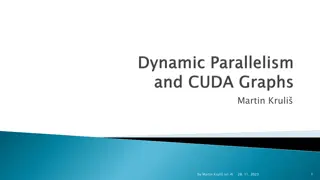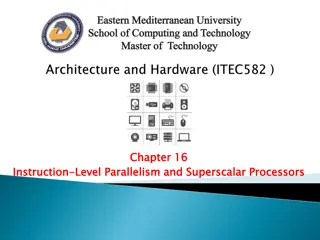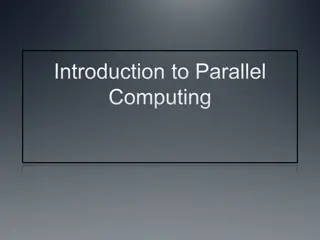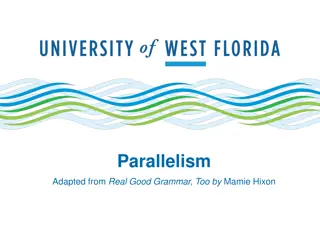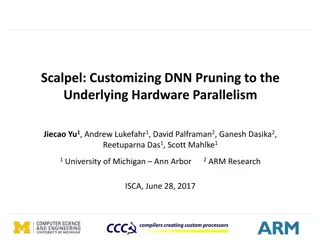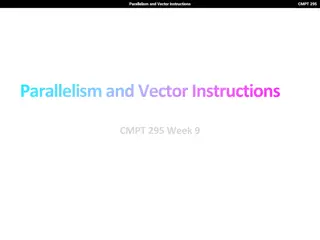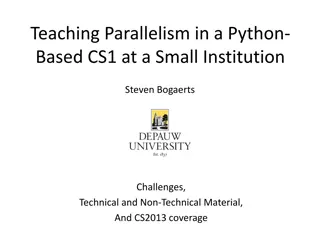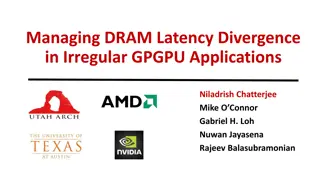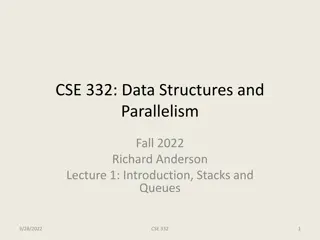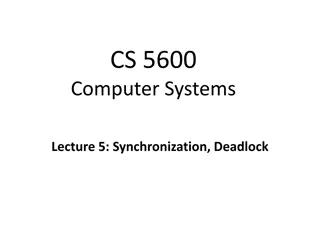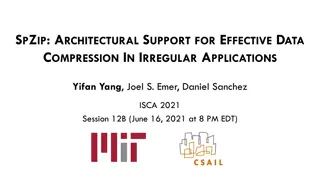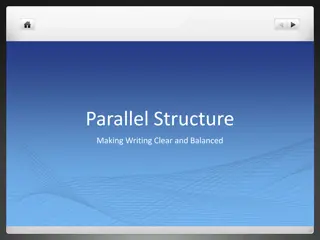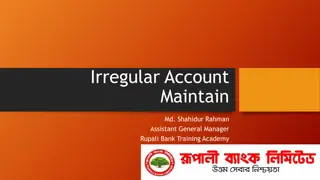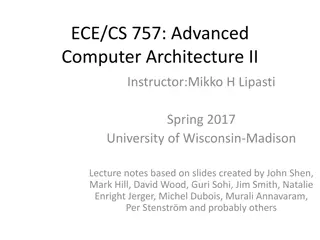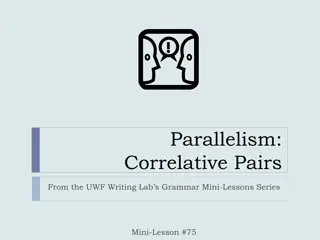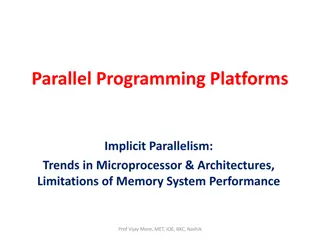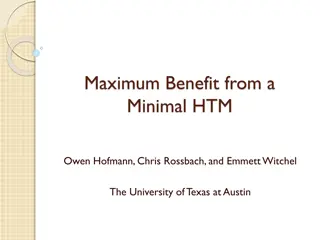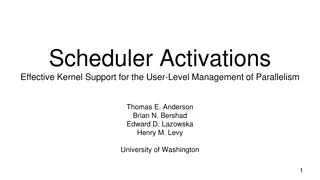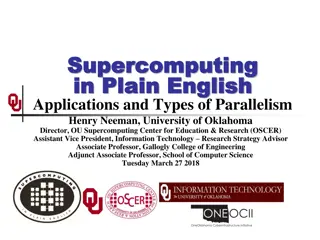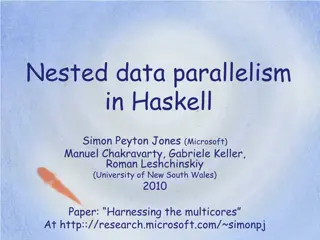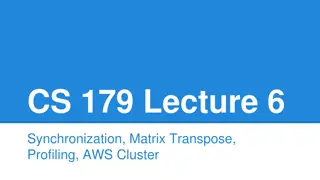Understanding Parallelism in GPU Computing by Martin Kruli
This content delves into different types of parallelism in GPU computing, such as task parallelism and data parallelism, along with discussing unsuitable problems for GPUs and providing solutions like iterative kernel execution and mapping irregular structures to regular grids. The article also touc
1 views • 39 slides
Crash Course in Supercomputing: Understanding Parallelism and MPI Concepts
Delve into the world of supercomputing with a crash course covering parallelism, MPI, OpenMP, and hybrid programming. Learn about dividing tasks for efficient execution, exploring parallelization strategies, and the benefits of working smarter, not harder. Discover how everyday activities, such as p
0 views • 157 slides
Understanding Irregular Immigration Beyond Stereotypes
The issue of irregular immigration has gained prominence in recent decades, particularly in the context of increased immigration policies and border closures. While there is a general trend towards more restrictions on immigration in Europe and the Global North, there remains a lack of clarity on wh
0 views • 23 slides
Understanding Superscalar Processors in Processor Design
Explore the concept of superscalar processors in processor design, including the ability to execute instructions independently and concurrently. Learn about the difference between superscalar and superpipelined approaches, instruction-level parallelism, and the limitations and design issues involved
0 views • 55 slides
Irony, Paradox, Oxymoron, and Parallelism in Frankenstein
Exploring the concepts of irony, paradox, oxymoron, and parallelism in Mary Shelley's "Frankenstein." The discussion covers different types of irony such as situational, verbal, and dramatic, highlighting instances from the novel. Additionally, the concept of paradox is examined, showcasing statemen
0 views • 16 slides
Understanding Irregular Heart Words in Teaching
Exploring the concept of irregular heart words in teaching where common words present challenges due to irregularities in letter-sound correspondences. Learn how to help students decode and master these irregular words effectively through targeted activities and teaching tips.
0 views • 181 slides
Understanding Coordination and Parallelism in Sentence Structure
This informative content delves into the concepts of coordination and parallelism in sentence structure, highlighting coordinating conjunctions, different types of conjunctions, examples of parallel structure, and the importance of maintaining parallelism in lists, series, comparisons, and contrasti
0 views • 52 slides
Exploring Parallel Computing: Concepts and Applications
Dive into the world of parallel computing with an engaging analogy of picking apples, relating different types of parallelism. Learn about task and data decomposition, software models, hardware architectures, and challenges in utilizing parallelism. Discover the potential of completing multiple part
0 views • 27 slides
Mastering Parallelism in Writing
Learn the art of parallelism in writing through examples and explanations. Understand how to maintain consistency in lists, phrases, clauses, conjunctions, and correlative conjunctions for clear and effective communication.
0 views • 10 slides
Provincial Treasury Process for Dealing with Irregular Expenditures
The Provincial Treasury outlines the process for handling irregular expenditures, including the definition of irregular expenditure, regulations introduced, legal opinions, and duties of Accounting Officers (AOs) and Authorized Officials (AAs) to prevent and address irregularities. Various steps and
0 views • 12 slides
Mastering Parallelism in Writing: Examples and Techniques
Understand the essential principle of parallelism in writing, ensuring items in a series are grammatically equivalent. Explore examples of correct and incorrect parallel structures to enhance your writing skills effectively.
0 views • 7 slides
Optimizing DNN Pruning for Hardware Efficiency
Customizing deep neural network (DNN) pruning to maximize hardware parallelism can significantly reduce storage and computation costs. Techniques such as weight pruning, node pruning, and utilizing specific hardware types like GPUs are explored to enhance performance. However, drawbacks like increas
0 views • 27 slides
Understanding Parallelism and Vector Instructions in CMPT 295
Delve into the world of parallelism and vector instructions in CMPT 295 as you explore fixed-length vector intrinsics, RISC-V concepts, computer programming fundamentals, processor execution processes, scalar and vector loops, and more. Discover the intricacies of memory, data arrays, structs, integ
1 views • 45 slides
Understanding Regular and Irregular Verbs in Simple Past Tense
Learn how to form the simple past tense with regular and irregular verbs. Regular verbs end in "-ed," while irregular verbs have unique past tense forms. Examples and images illustrate the differences, helping you master past tense verb usage effortlessly.
0 views • 11 slides
Teaching Parallelism in Python-Based CS1 at Small Institution
Explore challenges, technical and non-technical materials, and coverage of CS2013 in teaching parallelism in a Python-based CS1 course at a small institution. Overcome student inexperience with a mix of technical and non-technical content, including coding the multiprocessing module in Python and an
0 views • 7 slides
Understanding Irregular Adverbs in English Grammar
Explore irregular adverbs, flat adverbs, irregular adverbs of degree, negatives as adverbs, and the difference between "good" and "well" in English grammar. Learn how irregular adverbs modify verbs, adjectives, and other adverbs, with examples and visual aids provided.
0 views • 11 slides
Microarchitectural Performance Characterization of Irregular GPU Kernels
GPUs are widely used for high-performance computing, but irregular algorithms pose challenges for parallelization. This study delves into the microarchitectural aspects affecting GPU performance, emphasizing best practices to optimize irregular GPU kernels. The impact of branch divergence, memory co
0 views • 26 slides
Managing DRAM Latency Divergence in Irregular GPGPU Applications
Addressing memory latency challenges in irregular GPGPU applications, this study explores techniques like warp-aware memory scheduling and GPU memory controller optimization to reduce DRAM latency divergence. The research delves into the impact of SIMD lanes, coalescers, and warp-aware scheduling on
0 views • 33 slides
Mastering Parallelism in Thesis Statements
Learn how to apply parallel structure effectively in your thesis statement for improved clarity and coherence. Discover examples of both correct and incorrect parallelism to avoid common errors.
0 views • 13 slides
Introduction to CSE 332: Data Structures and Parallelism with Richard Anderson
Welcome to CSE 332: Data Structures and Parallelism with Richard Anderson! This course covers fundamental data structures, algorithms, efficiency analysis, and when to use them. Topics include queues, dictionaries, graphs, sorting, parallelism, concurrency, and NP-Completeness. The outline includes
0 views • 29 slides
Exploring Hardware SIMD Parallelism Abstraction
Understanding the inherent parallelism in applications can lead to high performance with less effort, but the alignment with how Linux and C++ compilers discover parallelism is crucial. The shift towards making parallel computing more mainstream highlights the importance of SIMD operations and oppor
0 views • 50 slides
Illustrated Irregular Verbs for Learning English Vocabulary
Explore a visual collection of irregular English verbs through engaging images. Each verb is paired with its past simple and past participle forms to aid in learning and memorization. Enhance your language skills with this creative approach to mastering irregular verbs.
0 views • 40 slides
Understanding Parallelism in Computer Systems
This content delves into various aspects of parallelism in computer systems, covering topics such as synchronization, deadlock, concurrency vs. parallelism, CPU evolution implications, types of parallelism, Amdahl's Law, and limits of parallelism. It explores the motivations behind parallelism, diff
0 views • 48 slides
Architectural Support for Effective Data Compression in Irregular Applications
Irregular applications, such as graph analytics and sparse linear algebra, are memory-bound workloads. This paper discusses the challenges of compressing data structures in irregular applications, focusing on specialized hardware to accelerate data access and decompression. The study highlights the
0 views • 26 slides
Enhancing Writing with Parallel Structure
Explore the concept of parallel structure in writing, its importance, and how it can improve the clarity and balance of your written work. Learn from famous examples by Eleanor Roosevelt and Martin Luther King, Jr., while also understanding the pitfalls of faulty parallelism. Discover how correct pa
0 views • 8 slides
Understanding Irregular and Dormant Bank Accounts
Irregular accounts in banks refer to accounts that are not operated regularly, such as dormant, unclaimed, or deceased accounts. When an account holder fails to manage their account properly, it can lead to the account becoming irregular. Dormant accounts are those that have had no financial activit
0 views • 27 slides
Understanding Threads and Concurrency in Systems Programming
Delve into the world of threads, exploring their concepts, schedulers, memory access speeds, and lightweight vs. heavyweight distinctions. Discover how NUMA machines enhance parallelism, the role of threads in Linux kernel management, and examples like word count applications. Gain insights into man
0 views • 55 slides
Understanding Parallel Software in Advanced Computer Architecture II
Exploring the challenges of parallel software, the lecture delves into identifying and expressing parallelism, utilizing parallel hardware effectively, and debugging parallel algorithms. It discusses functional parallelism, automatic extraction of parallelism, and finding parallelism in various appl
0 views • 86 slides
Advanced Spanish Preterite Tense Irregular Verbs and Conjugations
Dive into advanced Spanish conversation with a focus on preterite tense irregular verbs and conjugations. Practice sentence translations, engage in conversation exercises using the preterite tense, learn new vocabulary, and review general notes for past tense usage in Spanish. Explore the conjugatio
0 views • 11 slides
Mastering Parallelism: Understanding Correlative Pairs in Writing
Explore the importance of parallelism in correlative pairs in writing using frequently used conjunctions like Both/and, Either/or, and more. Learn to identify and correct common errors in correlative pairs to enhance the clarity and coherence of your writing. Dive into this insightful lesson brought
0 views • 6 slides
Mastering Parallelism with Correlative Pairs in Grammar
Understanding the importance of parallelism in grammar, particularly with correlative pairs, is essential for effective writing in standard English. This mini-lesson covers the correct usage of correlative conjunctions and provides examples to clarify common errors. By employing parallel grammatical
0 views • 4 slides
Trends in Implicit Parallelism and Microprocessor Architectures
Explore the implications of implicit parallelism in microprocessor architectures, addressing performance bottlenecks in processor, memory system, and datapath components. Prof. Vijay More delves into optimizing resource utilization, diverse architectural executions, and the impact on current compute
0 views • 47 slides
Simplifying Parallelism with Transactional Memory
Concurrency is advancing rapidly, making parallel programming challenging with synchronization complexities. Transactional memory offers a solution by replacing locking with memory transactions, optimizing execution, and simplifying code for enhanced performance. Despite the challenges, transactiona
0 views • 64 slides
User-Level Management of Parallelism: Scheduler Activations
This content delves into the comparison between kernel-level threads and user-level threads in managing parallelism. It discusses the challenges and benefits associated with each threading model, highlighting the trade-offs between system overhead, flexibility, and resource utilization. The concept
0 views • 39 slides
Supercomputing in Plain English: Applications and Types of Parallelism
Explore the world of supercomputing with Henry Neeman from the University of Oklahoma. Join this informative session to learn about applications and types of parallelism in plain English. Remember to download the slides beforehand and mute yourself during the session for an optimal experience. Find
0 views • 107 slides
Overview of Nested Data Parallelism in Haskell
The paper by Simon Peyton Jones, Manuel Chakravarty, Gabriele Keller, and Roman Leshchinskiy explores nested data parallelism in Haskell, focusing on harnessing multicore processors. It discusses the challenges of parallel programming, comparing sequential and parallel computational fabrics. The evo
0 views • 55 slides
Irregular Verbs: A Handy Guide to Commonly Used English Verbs
An overview of irregular verbs in English, including common examples of irregular verbs and their past participle forms. The content also includes images illustrating the verbs in different forms, making it easier to understand and remember irregular verb patterns. Helpful for English learners and a
0 views • 6 slides
Understanding Irregular Migrants and the Doctrine of Illegality
Exploring the concept of illegality doctrine in relation to irregular migrant workers' statutory claims, the potential impact of Patel v Mirza case, and the general structure of examining the employment rights of irregular migrants. The discussion delves into the characterization of statutory rights
0 views • 11 slides
Understanding Atomics and Parallelism in Programming
Explore the world of atomics, parallelism, memory access optimizations, and sequential consistency in programming. Dive into concepts such as races in multithreading, cache optimizations, and the importance of memory access order before and after compiler optimizations. Witness live demos showcasing
0 views • 46 slides
Parallelism and Synchronization in CUDA Programming
In this lecture on CS.179, the focus is on parallelism, synchronization, matrix transpose, profiling, and using AWS clusters in CUDA programming. The content delves into ideal cases for parallelism, synchronization examples, atomic instructions, and warp-synchronous programming in GPU computing. It
0 views • 29 slides
